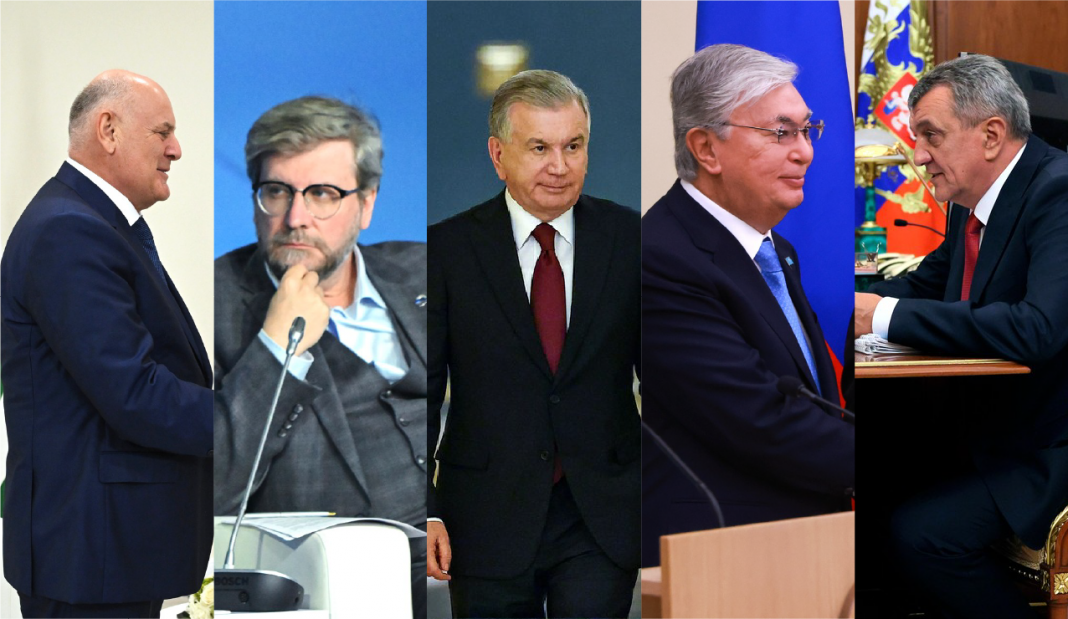This report describes the key events that significantly impacted Russia’s political, economic and social processes.
Based on the results of the past week, the following trends can be summarised:
- It is vital for Putin to secure the Caucasus direction since experts have repeatedly predicted the possibility of mass unrest and attacks on Russia from this direction. That is why, shortly, we will witness steps to strengthen the Kremlin’s position in the Caucasus. It is quite possible that Menyailo is being considered as the president’s permanent representative in the North Caucasus – with emergency powers.
- Putin is not familiar (or pretends that he is not) with the real state of affairs in Russia and the combat zone in Ukraine. His assessments regarding several indicators (economic, military, and social) differ noticeably in his public speeches. An attempt to create an image of “continuous victories” looks more like a persistent formation of an alternative reality than a demonstration of stability and sustainability.
- Russia’s policy of “nuclear diplomacy” continues to bear fruit. Russia is opening more and more nuclear power plants, which will become an element of the system for promoting Russian national interests in various world regions. The “nuclear diplomacy” authors are the Kovalchuk brothers and Sergei Kiriyenko.
This digest highlights the following topics that were most relevant for Russia during 2nd-8th of October:
1. Meeting with the head of the Republic of North Ossetia-Alania, Sergei Menyailo;
2. Participation of Vladimir Putin in the plenary session of the XX meeting of the Valdai International Discussion Club;
3. Meeting of Vladimir Putin with the President of the partially recognised Republic of Abkhazia Aslan Bzhania;
4. Ceremony on the occasion of the delivery of nuclear fuel to the Rooppur NPP;
5. Meeting of Vladimir Putin with the President of Uzbekistan Shavkat Mirziyoyev;
6. Ceremony to mark the start of Russian gas supplies to Uzbekistan through the territory of Kazakhstan;
7. Celebrating Vladimir Putin’s birthday;
8. Russia’s reaction to Israel’s events.
This Content Is Only For Subscribers
- Meeting with the head of the Republic of North Ossetia-Alania, Sergei Menyailo
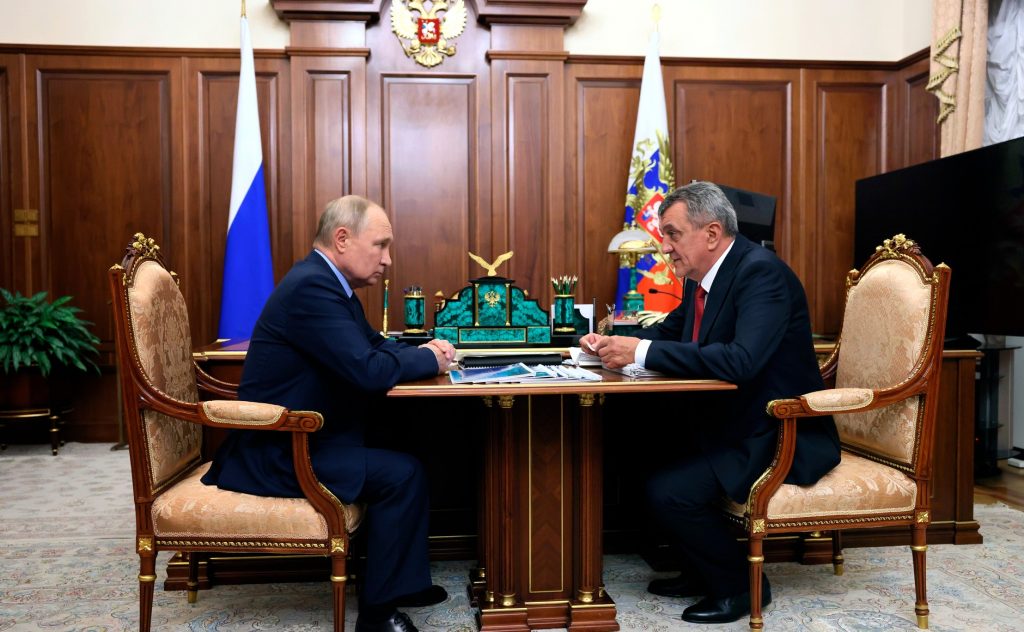
On Monday, October 2, a working meeting between Vladimir Putin and the head of the Republic of North Ossetia-Alania, Sergei Menyailo, took place in the Kremlin. The main topic of the meeting was the socio-economic development of the region. The parties also discussed the implementation of new infrastructure facilities in the area, a program to combat landslides and other natural disasters, and the participation of residents of the Republic in aggression against Ukraine.
Key theses:
- Menyailo: “For seven months compared to last year, the index of industrial production in the republic is 110 per cent, increased by 10 per cent; this is the fifth place in Russia in terms of growth.”
- Menyailo: “We have restored one plant, this is a copper plant, which is now in demand; pure copper and vacuum welding are used for the military-industrial complex and electronics. A plant for producing all types of feed has been rebuilt – this is 250 thousand tons per year if it reaches full capacity. Two factories – stone processing and foam concrete.”
- Menyailo: “The 58th Army, based in Vladikavkaz, participates in the [so-called] SMO.” We got involved – public associations and authorities, including local authorities – to help.”
Outcomes and outlook:
Putin’s meeting with Sergei Menyailo is a rather severe signal for the regional elites. Menyailo is Putin’s creature, a person whom he sincerely trusts. In 2014, Menyailo took an active part in annexing Crimea to Russia (occupation of the peninsula) and became the governor of Sevastopol. Subsequently, Menyailo was sent to Siberia to restore order as the head of the Siberian Federal District. Putin’s meeting with Menyailo foresaw not only discussions about the socio-economic situation in North Ossetia-Alania, which ranks 64th among the constituent entities of the Russian Federation in terms of population and 64th place in terms of income.
The Presidential Plenipotentiary Representative in the North Caucasus Federal District may be replaced soon. Former Prosecutor General Yuri Chaika, appointed to this post in January 2020, has recently increasingly come under fire. It is believed that he came under the influence of Ramzan Kadyrov. In Moscow, they joke that Chaika works as Kadyrov’s Plenipotentiary Representative in the North Caucasus District. The issue of Chaika’s resignation and sending him into retirement was raised more than once: in May, he turned 72 years old. Rear Admiral Sergei Menyailo is a rather challenging and efficient person. He not only formed the Alania battalion, which he sent to fight against Ukraine, but he repeatedly visited the front line (and was even wounded and shell-shocked).
Putin needs to secure the Caucasian direction since experts have repeatedly predicted the possibility of mass unrest and attacks on Russia from this direction. That is why, shortly, we will witness steps to strengthen the Kremlin’s position in the Caucasus. It is quite possible that Menyailo is being considered as the president’s permanent representative in the North Caucasus – with emergency powers.
- Participation of Vladimir Putin in the plenary session of the XX meeting of the Valdai International Discussion Club
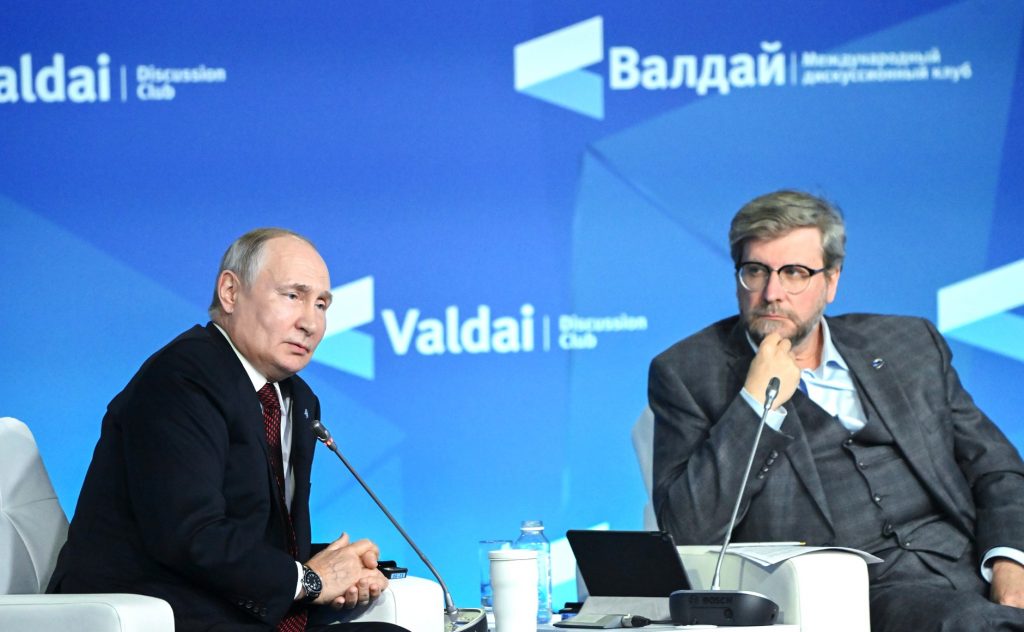
On Thursday, October 5, the plenary session of the XX meeting of the Valdai International Discussion Club took place. As usual, Vladimir Putin also took part in the discussion. It is worth noting that every year, this platform is used by the Russian president, to sum up the first results of the year and voice the main theses regarding the Kremlin’s plans. This approach has always provoked special interest from the world community.
This year, Putin’s speech lasted more than two hours. The Russian president commented on several foreign policy events and voiced his position on the war in Ukraine, relations with the West and other issues.
Previously, Ascolta studied in detail Putin’s statements at the Valdai plenary session and identified the main changes in the Russian president’s rhetoric and possible consequences for the Kremlin’s foreign policy positions.
Key theses of Putin’s speech:
- “Russia has overcome the most difficult period of recovery after the collapse of the USSR. With all our energy and goodwill, we became involved in building a new, as it seemed to us, more equitable world order. Fortunately, our country can greatly contribute since we have something to offer our friends, partners, and the world.”
- “The USA and its satellites have firmly taken a course towards hegemony – military, political, economic, cultural, moral and value-based. From the beginning, it was clear that attempts to establish a monopoly were doomed to failure.”
- “After all, there was a moment when your humble servant simply suggested: maybe we should join NATO? But no, such a country is not needed in NATO. No. The question is, what else? We thought we were already our own, excuse me, as our people say, bourgeois. What else?
- “I have said more than once that we did not start the so-called “war in Ukraine.” On the contrary, we are trying to finish it. It was not we who organised the coup d’etat in Kyiv in 2014 – a coup d’etat, bloody and unconstitutional. Wherever it happens, we always immediately hear all the world’s media [mass media], subordinate, first of all, of course, to the Anglo-Saxon world: this is impossible, it is impossible, it is anti-democratic. But here it is possible. They even named the money the amount of money that was spent on this coup. Everything is possible”.
- “The war started by the Kyiv regime with the active, direct support of the West is now in its tenth year, and the [so-called] “special military operation” is aimed at stopping it. And it reminds us that unilateral steps will inevitably be met with retaliatory actions, no matter who takes them.”
- “We have no interest in terms of conquering any additional territories. We still must explore and develop Siberia, Eastern Siberia and the Far East. This is not a territorial conflict or even establishing a regional geopolitical balance. The question is much broader and more fundamental: we are talking about the principles on which the new world order will be based.”
- “It is obvious that adherence to bloc approaches, the desire to drive the world into a constant confrontation between “us and them” is a vicious legacy of the 20th century. This is a product of Western political culture, at least its most aggressive manifestations. I repeat, the West always needs an enemy – a certain part of the West, the Western elites.”
- “Artificial geopolitical structures are being imposed on the world, closed bloc formats are being created. We see this in Europe, where they have been pushing forward NATO expansion for decades, and in the Asia-Pacific and southern Asia, where they are trying to break down cooperation’s open and inclusive architecture. The bloc approach, let’s call a spade a spade, is a restriction of the rights and freedoms of states to their development, an attempt to drive them into a certain cage of obligations.”
- “Humanity has means that, as we know, can easily destroy the entire planet, and manipulation of consciousness on an incredible scale leads to a loss of sense of reality. Of course, we need to get out of this vicious circle and look for some way out. As I understand it, dear friends and colleagues, you are gathering at the Valdai site for this purpose.”
- “The main qualities of a state-civilisation are diversity and self-sufficiency. Here are the two main components, in my opinion. The modern world is alien to any unification; every state and society wants to develop its development path independently.”
- “We want to live in an open, interconnected world in which no one will ever try to erect artificial barriers to people’s communication, creativity and prosperity. There should be a barrier-free environment – that’s what we should strive for.”
- “We are for universal security and lasting peace, built on respect for the interests of everyone: from great, large states to small countries. The main thing is to free international relations from the bloc approach, from the legacy of the colonial era and the Cold War.”
- “Russia was, is and will be one of the foundations of the world system, ready for constructive interaction with everyone who strives for peace and prosperity, ready for tough opposition to those who profess the principles of dictatorship and violence.”
- “As for Europe, the situation here is more complicated because if in the United States, we still observe economic growth over the previous period of 2.4 per cent of GDP, then in Europe, the situation is much worse.”
- “We have rebuilt logistics, mechanical engineering is growing, and so on. Overall, we have a stable, stable situation. We overcame all the problems after the sanctions were imposed on us and began the next stage of development – on a new basis, which is extremely important.”
- “We have offered our Armenian friends many times over the past 15 years to compromise. Which? Return five regions around Karabakh to Azerbaijan, keep two for themselves, and thus preserve the territorial connection between Armenia and Karabakh.”
- “In Prague in the fall of 2022, under the auspices of Mr Michel, then President of France Macron and Mr Scholz, Chancellor of the Federal Republic of Germany, the leaders of Armenia and Azerbaijan gathered and signed a statement from which follows that Armenia recognised Karabakh as part of the Republic of Azerbaijan.”
- “There is no situation in which, say, today, something would threaten Russian statehood and the existence of the Russian state, no. No person in his right mind and clear memory would think of using nuclear weapons against Russia.”
- “The last successful test of the Burevestnik, a global-range cruise missile with a nuclear propulsion system, was carried out. We have finished work on the Sarmat, a super-heavy rocket. The question is that we just need to complete some purely administrative and bureaucratic procedures, move on to their mass production, and put them on combat duty. We will do this soon.”
- “Firstly, a “window to Europe.” You know, just now, my colleagues said the world is changing, and climbing back and forth through the “window” all the time, tearing your pants is not the best thing. And why climb through the window when there are other doors?”
- “Even today, cooperation between Russia and the People’s Republic of China is a significant factor stabilising international life.”
- “We have never objected or expressed any negative position regarding plans for Ukraine to join the European Economic Community, ever.”
- “Is the European Union ready to accept such an economy [Ukrainian] into its membership? Flag in hand and forward. But to maintain the population’s viability, which has already decreased since the beginning of the post-Soviet period from 41 million to 19 and a half, and maybe even that is no longer there, 19 million need to be fed; this is not an easy task. Are European countries ready to take on such an economy? Let them take it. We have never been against it – before the aggravation of this crisis, and we are not against it now.”
Outcomes and outlook:
In his speech, Putin touched on several main topics, trying to shape Russia’s position towards Ukraine, Armenia, the USA, Europe, and several regional partners (China, India, and Kazakhstan). He also once again tried to demonstrate that despite sanctions pressure, the Russian economy maintains a stable position and allows it to continue military operations against Ukraine and the economic war against the West.
In general, we can determine several main trends that Putin tried to focus on:
- Firstly, Putin is not familiar (or pretends that he is not) with the actual state of affairs in Russia as a whole and in the combat zone in Ukraine. His assessments regarding several indicators (economic, military, and social) differ noticeably in his public speeches. An attempt to create an image of “continuous victories” looks more like a persistent formation of an alternative reality than a demonstration of stability and sustainability.
- Secondly, Putin is increasingly demonstrating his readiness to negotiate with the West, hinting at several concessions that the Russian president had not previously voiced. In this case, we are talking about the Ukrainian issue (although Putin hints at the readiness to return to the occupied territories) and geopolitical relations in general. The main message that Putin is trying to convey is the desire to achieve mutual security guarantees, which were discussed in the fall of 2021.
- Thirdly, Putin is demonstrating fatigue with the Ukrainian issue, in which Russia has reached a complete impasse. Of course, the resumption of rhetoric in the spirit of “we will achieve the goals of the so-called “SMO” or we want to “denazify Ukraine” may still evoke positive feelings among individual Russian citizens, but in this speech, it is more important to state the readiness to begin the negotiation process, offering softer conditions.
Ascolta made a more detailed analysis of the key theses of Vladimir Putin at the plenary session of the 20th meeting of the Valdai International Discussion Club here.
- Meeting of Vladimir Putin with the President of the partially recognised Republic of Abkhazia Aslan Bzhania
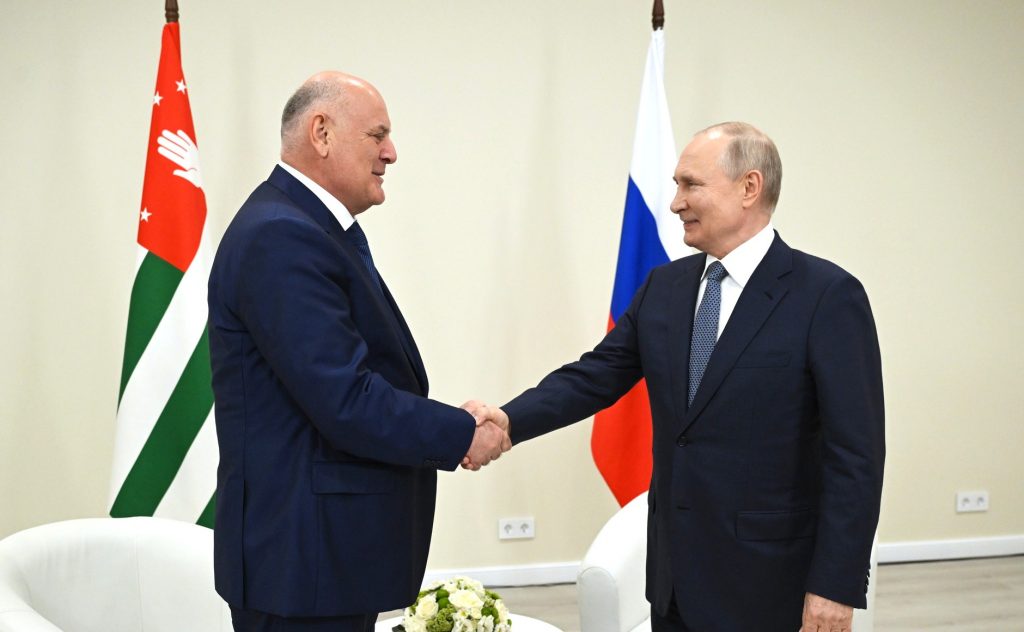
On Wednesday, October 4, Vladimir Putin met with the President of the Republic of Abkhazia, Aslan Bzhania, who is in Russia on a working visit. During the public part of the meeting, the parties exchanged views on the development of the partially recognised state. Also, they noted the development of bilateral relations in economics. At the same time, according to Ascolta, the main issues discussed behind closed doors concerned a broader area.
Outcomes and outlook:
Putin’s meeting with Aslan Bzhania and Sergei Menyailo are linked in one chain: strengthening Russia’s position in the North Caucasus, where possible disruptions in stability and escalation of the conflict are predicted shortly. In this regard, Abkhazia (which is only formally considered an “independent” state but is a territory illegally seized from Georgia and under a Russian protectorate) is regarded as one of the possible outposts of Russian policy in the Caucasus.
The 7th Russian military base with up to 4 thousand people is located here; perhaps the number of military personnel will be increased. Abkhazia is also the key to relations with Georgia. Russia deliberately does not include Abkhazia and South Ossetia in the Russian Federation because it understands that this is an opportunity for bargaining with the Georgian government, which takes a neutral position in the Russian-Ukrainian war. Russia may even begin returning South Ossetia to Georgia (with certain conditions). But Abkhazia is a strategically important region from Russia’s point of view, and the meeting with Bzhania once again emphasised this.
- Ceremony on the occasion of the delivery of nuclear fuel to the Rooppur NPP
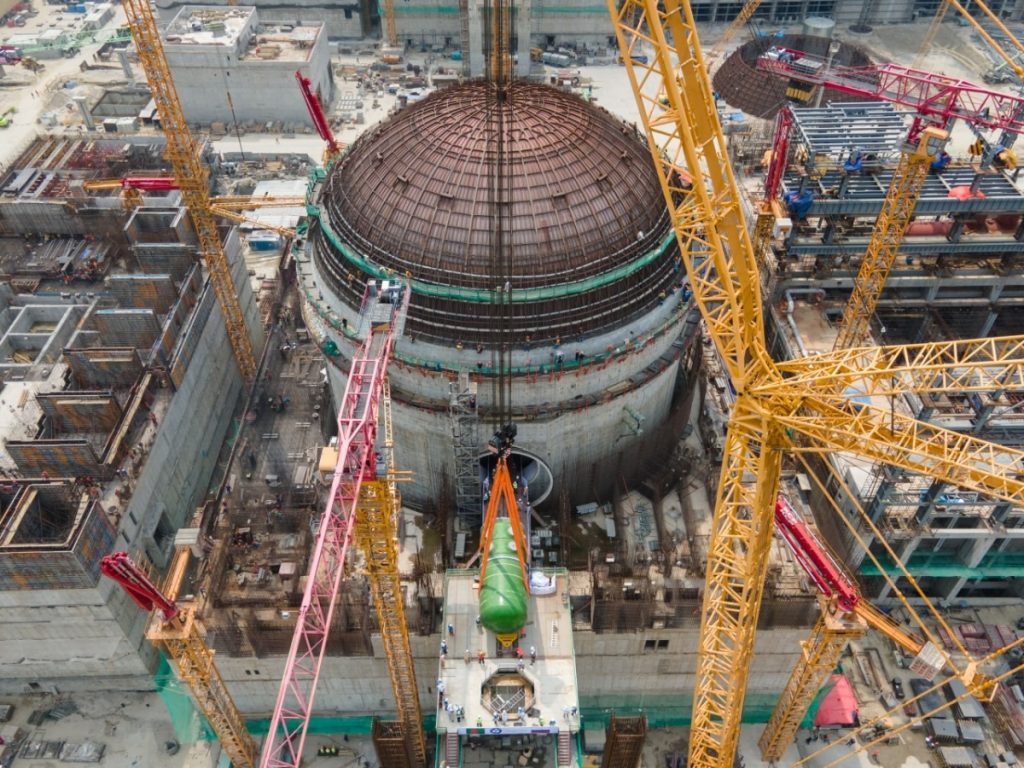
On Thursday, October 5, Vladimir Putin, together with the Prime Minister of the Republic of Bangladesh, Sheikh Hasina, took part in a ceremony via videoconference to mark the delivery of Russian nuclear fuel to power unit No. 1 of the Bangladeshi Rooppur nuclear power plant.
Construction of the station began in 2013. The nuclear power plant will consist of two III+ generation power units with a total capacity of 2,400 megawatts. More than 20 thousand specialists are involved in the work at the site, more than four thousand of whom are Russian specialists.
The ceremony was also attended by the Director General of the International Atomic Energy Agency (IAEA), Rafael Grossi, the Director General of the State Atomic Energy Corporation, Rosatom Alexey Likhachev, the Minister of Science and Technology of Bangladesh, Yefesh Osman, the director of the Rooppur NPP construction project Shavkat Akbar and the head of the General contractor for the construction of the Rooppur NPP Andrey Petrov.
Key theses:
- Putin: “Bangladesh is our long-time friend and good partner, with whom we interact on the principles of equality, mutual respect and consideration of each other’s interests.”
- Putin: “The Rosatom Corporation began construction of this nuclear power plant in 2013, and already in 2017 – after carrying out large-scale survey and preparatory work – the pouring of the foundation for the base of the first block of the nuclear power plant began on the banks of the great Ganges River.”
- Putin: “Once it reaches full design capacity, the plant will be able to supply about ten per cent of Bangladesh’s energy consumption—ten per cent is a large amount—meeting the energy needs of the growing Bangladeshi economy.”
- Sheikh Hasina: “We remain committed to Vision 2021 and have developed an energy roadmap. Nuclear energy was also included there. In 1996, the Rooppur NPP construction project began. We have developed a nuclear energy program for Bangladesh, we have sought the assistance of the IAEA, and with the wholehearted support of the IAEA, we have been able to develop a clear nuclear energy program.”
- Sheikh Hasina: “Many thanks also to the Prime Minister of India, Narendra Modi, for his support in implementing this project.”
- Sheikh Hasina: “Our country has overcome all adversities and is a role model for today’s world. Russia’s great merit is that our relations also contribute to the development of our country.”
Outcomes and outlook:
Russia’s policy of “nuclear diplomacy” continues to bear fruit. Russia is opening more and more nuclear power plants, which will become an element of the system for promoting Russian national interests in various world regions. The “nuclear diplomacy” authors are the Kovalchuk brothers and Sergei Kiriyenko.
The exceptional importance of Bangladesh lies in the fact that this state cooperates closely with India, and the electricity produced will partially go to India. Therefore, the Rooppur power plant is another link connecting Russia and India. It is essential for India that Rooppur can supply electricity to West Bengal, the country’s fastest-growing economy. Thus, Russia is gradually expanding its economic influence into Asia.
- Meeting of Vladimir Putin with the President of Uzbekistan Shavkat Mirziyoyev
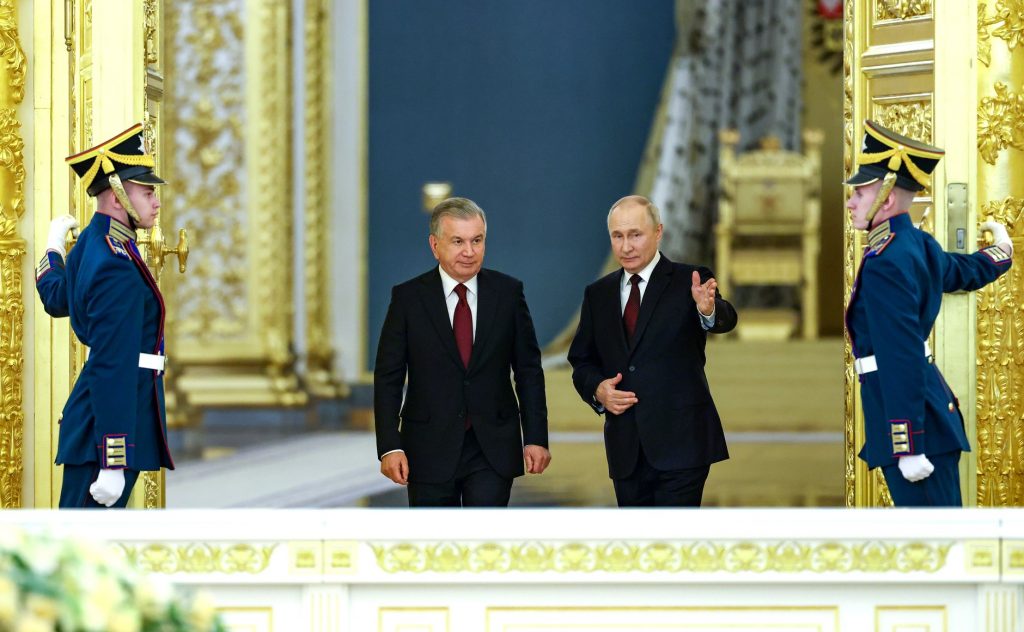
On Friday, October 6, President of Uzbekistan Shavkat Mirziyoyev arrived in Moscow on an official visit, where he met with Vladimir Putin. The parties discussed strengthening bilateral relations, as well as the implementation of joint infrastructure facilities. Also, during the meeting, several bilateral documents were signed:
• Joint statement by the President of the Russian Federation, V.V. Putin, and the President of the Republic of Uzbekistan, Sh.M. Mirziyoyev, on deepening relations of comprehensive strategic partnership and alliance
• Agreement between the Government of the Russian Federation and the Government of the Republic of Uzbekistan on the supply of petroleum products by rail
• Agreement between the Government of the Russian Federation and the Government of the Republic of Uzbekistan on expanding cooperation in the field of oil supplies
• Agreement between the Government of the Russian Federation and the Government of the Republic of Uzbekistan on the establishment of the Consulate General of the Russian Federation in the city of Samarkand
• Cooperation program between the Ministry of Foreign Affairs of the Russian Federation and the Ministry of Foreign Affairs of the Republic of Uzbekistan for 2024–2025.
• Agreement between the Federal Customs Service (Russian Federation) and the Customs Committee under the Ministry of Economy and Finance of the Republic of Uzbekistan on mutual recognition of the relevant institutions of the authorised economic operator
• Agreement between the Ministry of Economic Development of the Russian Federation and the Ministry of Investment, Industry and Trade of the Republic of Uzbekistan on cooperation on implementing the project for organising high-speed rail transportation “Agroexpress.”
• Memorandum of Understanding between the Federal Agency for Nationalities Affairs (Russian Federation) and the Committee on Interethnic Relations and Friendly Relations with Foreign Countries under the Ministry of Culture of the Republic of Uzbekistan
• Agreement between the federal state budgetary institution “National Research Center “Kurchatov Institute” and the Ministry of Higher Education, Science and Innovation of the Republic of Uzbekistan on scientific and scientific-technical cooperation
• Joint action plan for the implementation of agreements in the field of higher education, science and innovation between the Ministry of Science and Higher Education of the Russian Federation and the Ministry of Higher Education, Science and Innovation of the Republic of Uzbekistan for 2023–2025
• Memorandum of Understanding on the development of cooperation between JSC Russian Railways and JSC Uzbekistan Temir Yollari
Also, following the meeting, Vladimir Putin and Shavkat Mirziyoyev made several statements for the media.
Key theses:
- Putin: “During the negotiations, the topic of economic cooperation was discussed in great detail. Mutual readiness for its further deepening and diversification was demonstrated.”
- Putin: “Russia is Uzbekistan’s largest trading partner, and this year, the growth of counter export-import transactions has continued: in the first seven months, it grew by almost 15 per cent.”
- Putin: “Russia and Uzbekistan are vigorously switching to national currencies in financial transactions and building sustainable credit and banking cooperation channels. The share of the ruble, for example, in bilateral commercial transactions at the end of last year reached 47.5 per cent and continues to grow.”
- Putin: “Cooperation between Russia and Uzbekistan in the transport and logistics sector is expanding. The freight and passenger traffic volumes are growing steadily—manifold in some directions.”
- Putin: “Great prospects are opening up in this regard and for the development of such corridors as the international North-South corridor, from Russia and even from Belarus to the coast of the Indian Ocean, one of the routes running through Uzbekistan.”
- Mirziyoyev: “Currently, in the structure of export-import operations – I want to draw special attention to this – 70 per cent are industrial goods, products with high added value. We have never seen anything like this before. Over the past two or three years, our intensive work with Vladimir Vladimirovich has produced great results.”
- Mirziyoyev: “Cooperation in the educational sphere is also expanding. Today, there are already 15 branches of Russian universities in Uzbekistan. I think this is a great indicator. We will continue our cooperation in this direction.”
- Mirziyoyev: “The focus of our attention remains on the issues of countering traditional and new challenges and threats, primarily terrorism, extremism, organised crime and drug trafficking. In this direction, we agreed to deepen close interaction between Uzbekistan and Russia’s competent authorities and special services.”
Outcomes and outlook:
Shavkat Mirziyoyev is actively developing economic relations with Russia, China, the USA, Turkey, the Arab world, and Afghanistan. In this sense, Uzbekistan is Central Asia’s most dynamic and actively developing state. Uzbekistan, the largest state in the region, is experiencing a demographic boom (since 1991, the population of Uzbekistan has doubled to 34 million people; by 2030, the population is projected to increase to 40 million).
This creates a surplus of labour; a significant part of young Uzbeks go to work in Russia, Turkish and Arab countries. For Mirziyoyev, Russia is, first of all, a fuse against possible “colour” revolutions and protection from possible clashes with Afghanistan (Taliban, despite the developing economic relations between Tashkent and Kabul, and also even though the Uzbeks are the leading national minority in Afghanistan, have repeatedly expressed claims against Uzbekistan – for example, demanding the extradition of General Dostum). In addition, Mirziyoyev is trying to build a policy of balance in which Russia is assigned the role of a counterweight to China and other active players.
The visit of the head of Uzbekistan is also important through the prism of the big geopolitical game. In the coming weeks, a high-profile American delegation led by Antony Blinken is expected to arrive in Tashkent (he already visited Tashkent in March of this year, and in September, Mirziyoyev was part of a group of five presidents of Central Asian countries who met with Joe Biden). But the most crucial thing: Mirziyoyev is interested in the supply of Russian gas to Uzbekistan, which was the main reason for the visit.
- Ceremony to celebrate the start of Russian gas supplies to Uzbekistan through the territory of Kazakhstan
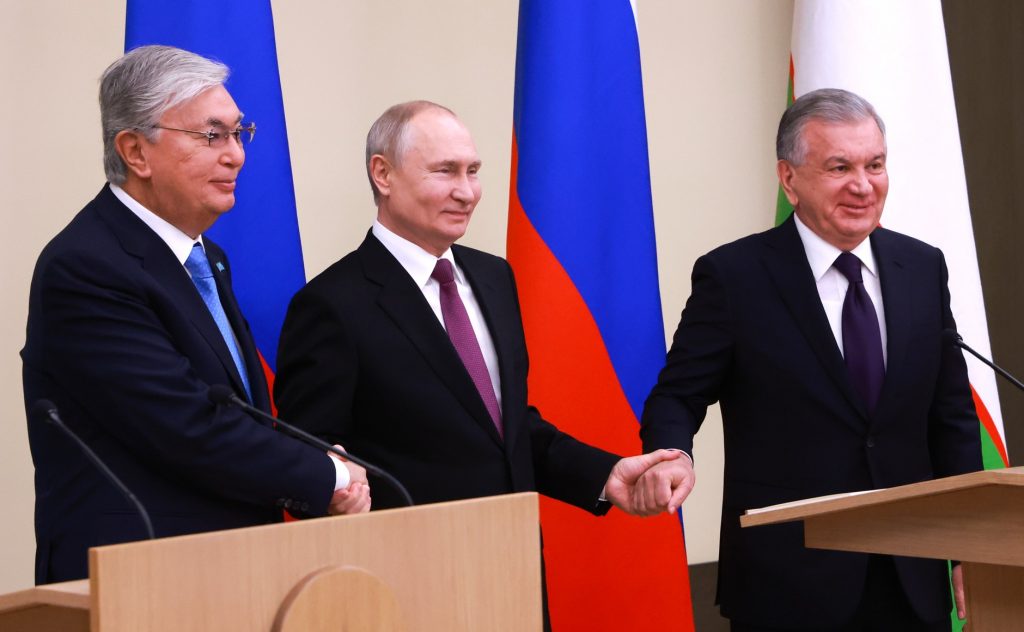
On Saturday, October 7, Vladimir Putin, Kassym-Jomart Tokayev and Shavkat Mirziyoyev took part in a ceremony marking the start of Russian gas supplies to Uzbekistan through the territory of Kazakhstan. The ceremony itself took place via video conference. Also, Alexey Miller, Chairman of the Board of Gazprom PJSC, reported on the implementation of the project via video.
Key theses:
- Putin: “We are talking about the largest trilateral energy project, for the implementation of which the Central Asia – Center gas pipeline, built back in the 60s, is used. Then it was, in fact, the first transcontinental Eurasian gas route, through which Uzbekistan then supplied gas – about 80 billion cubic meters per year – to eight union republics at once.”
- Putin: “The volume of work completed quickly is truly impressive. The Saratov region’s gas measuring station “Alexandrov Gai” has been modernised in Russia. In Kazakhstan, pipes have been repaired, and pumping capacity has been released. A gas measuring station and a new section of the Bukhara-Ural pipeline have been built in Uzbekistan.”
- Putin: “Implementing this project will benefit all three states. Uzbekistan will receive an additional source of energy supply, which will ensure an uninterrupted supply of heat and electricity to households and socially significant facilities. Kazakhstan will be able to solve the gasification issue of its northern and eastern regions. “Gazprom is already working on the appropriate routes and parameters for gas supply.”
- Tokayev: “The gas industry plays a large, one might say, a special role in the sustainable socio-economic progress of our states; therefore, this project meets the interests of all parties involved. Kazakhstan completed the preparation of the main gas pipeline on its territory promptly and in full. The project will ensure the diversification of Russian gas export supplies, will contribute to the expansion and modernisation of Kazakhstan’s gas transportation infrastructure and will allow Uzbekistan to meet the growing needs of Uzbekistan for natural gas in the amount of up to three billion cubic meters per year.”
- Tokayev: “More than 20 thousand kilometres of main gas pipelines with an annual throughput capacity of up to 255 billion cubic meters pass through the territory of Kazakhstan, and Kazakhstan is interested in the full use of its transit potential and is ready to increase the volume of Russian gas transportation further.”
- Mirziyoyev: “Interaction between Uzbekistan, Russia and Kazakhstan in the energy sector is reaching a qualitatively new level of development. Thanks to political will and joint efforts, a new gas transport corridor is being formed.”
- Mirziyoyev: “I am convinced that the implementation of such a large-scale project and its results will further strengthen the multifaceted relations of the three states and contribute to the prosperity and well-being of our countries and peoples.”
Outcomes and outlook:
Mirziyoyev and Tokayev are geopolitical competitors. Kazakhstan has the largest area in the region, and Uzbekistan has the largest population. Both presidents play by the same rules with several geopolitical players. Both are selling both their advantageous location and their mineral resources.
In this situation, Russia acts as a country that provides Kazakhstan and Uzbekistan with energy resources (for Uzbekistan, this is a more pressing issue). The gas pipeline creates the prerequisites for the creation in the future of a new transport corridor that can connect Kazakhstan and Uzbekistan – and, at the same time, become a bridge between the northern and southern branches of the Great Silk Road project, which is essential for both Central Asian republics, and for Russia and China.
- Celebrating Vladimir Putin’s birthday
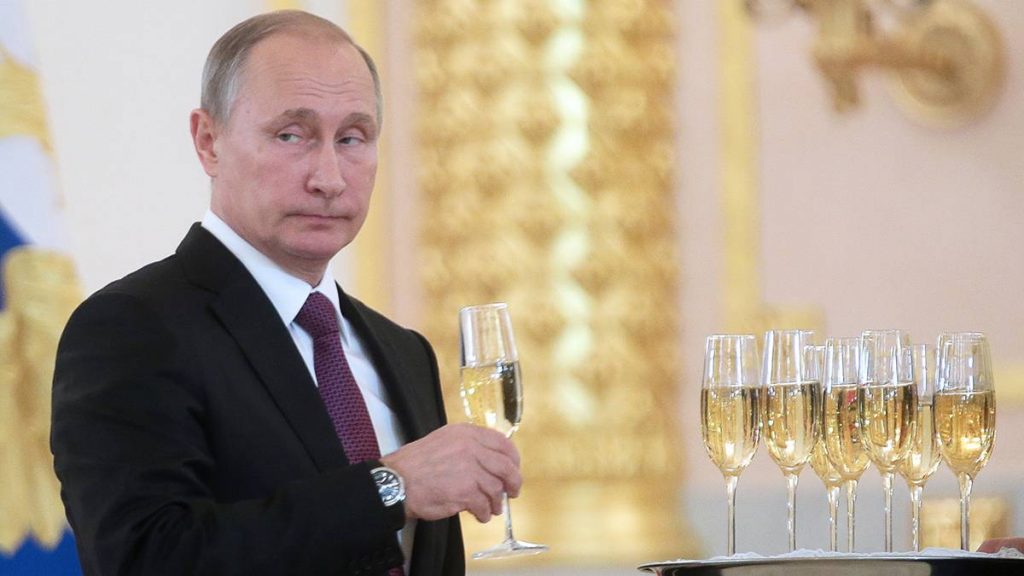
On Saturday, October 7, Vladimir Putin turned 71 years old. The Russian president spent part of the day in a working format, taking part in a ceremony marking the start of Russian gas supplies to Uzbekistan through the territory of Kazakhstan. At the same time, an orgy of congratulations to Putin erupted in the Russian segment of social networks, both from politicians or civil servants of the Russian Federation and from ordinary citizens who tried in every possible way to demonstrate their attitude towards the “leader”.
Outcomes and outlook:
Putin does not focus on private holidays – he often celebrates birthdays outside of Moscow, most often in a work environment. This is part of Putin’s image as “a man constantly at work.” The image imposed by PR specialists has become familiar to Russians. 2023 was no exception. However, regarding information, the celebration of Putin’s birthday took a back seat due to the war in Israel and Ukraine.
- Russia’s reaction to Israel’s events
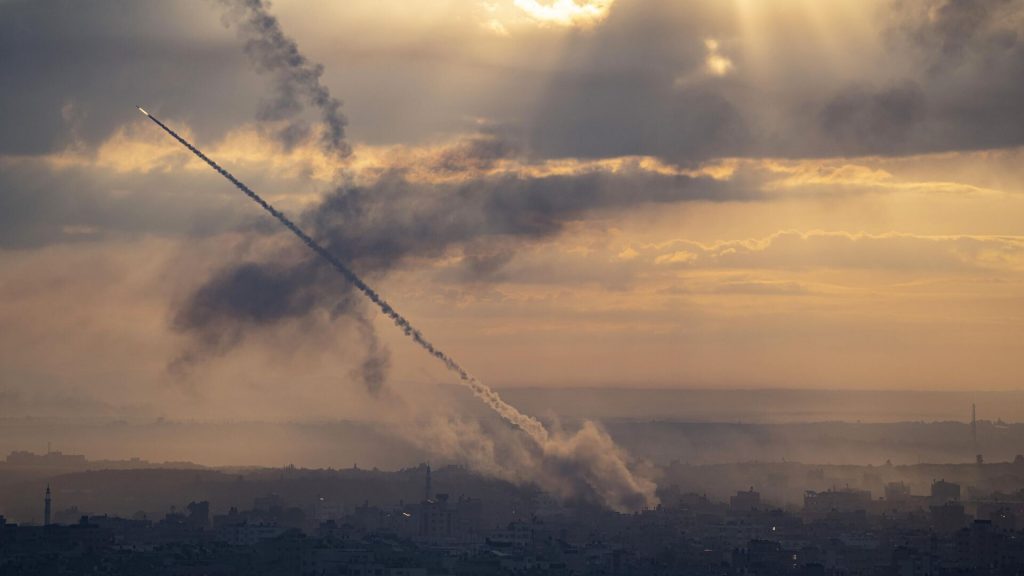
On the morning of October 7, Hamas attacked Israel from the Gaza Strip, a Palestinian territory. Due to the effect of surprise, the militants allegedly struck with the help of paragliders and sea boats – and managed to enter several settlements in the southeast of Israel: Sderot, Be’eri, Netivot and the largest of them – Ashkelon. They also captured an Israeli military base on the border with Gaza and arrested, according to preliminary information, more than fifty soldiers. They knocked out and seized several pieces of equipment, including Merkava tanks.
At the same time, Israel was subjected to heavy bombing. The Palestinians claim a salvo of five thousand rockets – Israel does not confirm this, but its Iron Dome system missed several strikes. After the attack, Hamas declared Operation Al-Aqsa Flood, named after the Muslim holy mosque in Jerusalem.
Several countries made official statements on the situation around Israel. Most condemned Hamas’ actions and called for an early cessation of hostilities and reduced regional escalation.
In particular, Russia also reacted to the events in Israel:
- Deputy Chairman of the Russian Security Council Dmitry Medvedev was the first to comment on the situation and blamed the United States for what was happening: “The start of clashes between Hamas and Israel on the day of the 50th anniversary of the start of the Yom Kippur War is an event that could have been expected. This is what Washington and its allies had to do. The conflict between Israel and Palestine has been going on for decades. And the US is a key player there.”
- Special Representative of the Russian President for the Middle East and Africa, Deputy Foreign Minister of the Russian Federation Mikhail Bogdanov, said that Russia is in contact with Israel, Palestine, and Arab countries in connection with the worsening of the Israeli-Palestinian conflict: “We are in contact with everyone now. With Israelis, Palestinians, Arabs. Now we will find out all the circumstances and understand everything.” Bogdanov also said Russia calls on all parties to the conflict to show restraint.
- At the same time, Israeli Ambassador to Russia Alexander Ben Zvi stated that Israel is in contact with Russia due to the war that has begun in the country with Hamas: “Israel is in contact with the Russian Federation regarding the situation with Hamas. We count on understanding.”
Outcomes and outlook:
Russia took a neutral wait-and-see position, trying not to quarrel with Palestine, with which it carefully built relations, or with Israel. Putin is also trying not to disrupt allied ties with Iran, which has decisively sided with Hamas. In any case, Moscow is making it clear: this is not its war.
Sergei Lavrov rather vaguely calls for peace and an end to the bloodshed. Putin is sending signals to Benjamin Netanyahu (it is essential for Russia that he retains the post of Prime Minister). But at the same time, Russia does not hide its joy at what is happening: events in Israel are putting the big deal between the United States and Saudi Arabia on the brink of failure. Under pressure from the United States, the Saudis agreed to increase oil production from 2024, which would lead to a decrease in world oil prices. This is extremely important for the United States but not beneficial for Russia. But an essential element of the deal was to be Saudi Arabia’s recognition of Israel. Now, obviously, this process will slow down.

